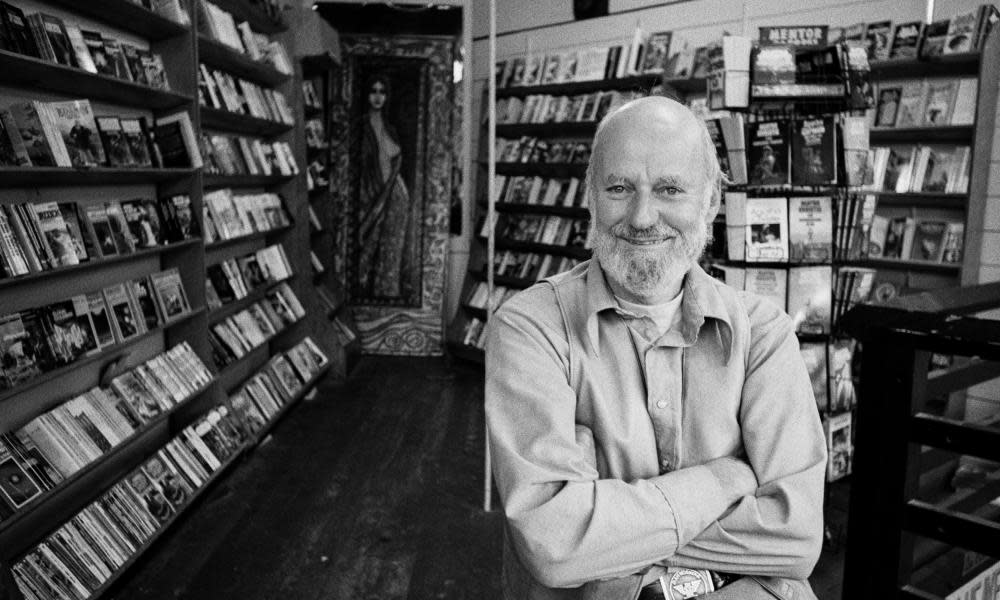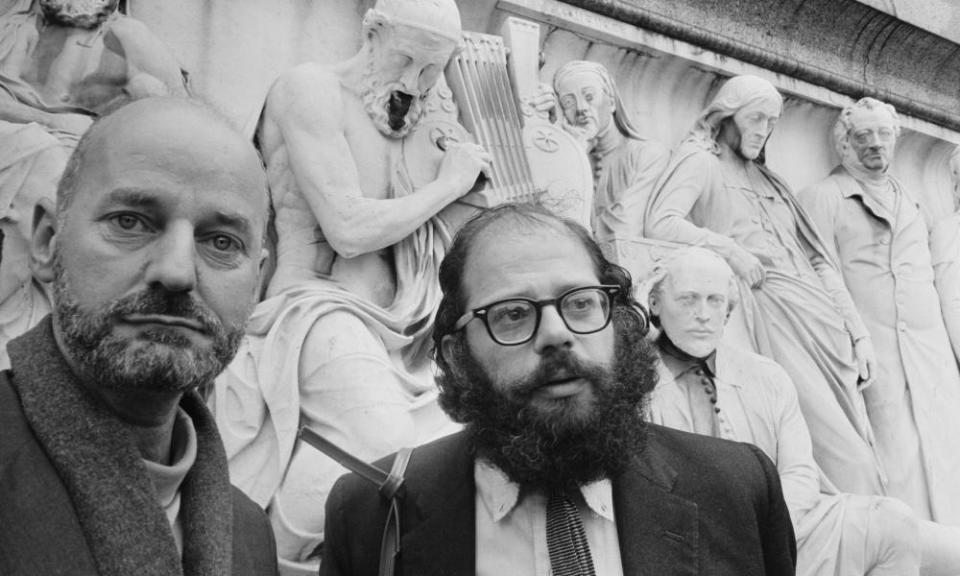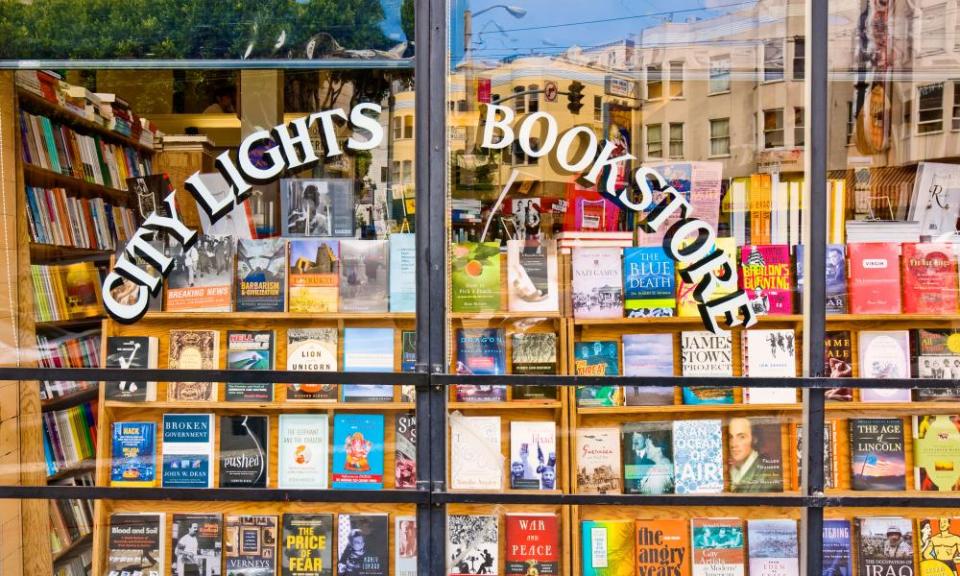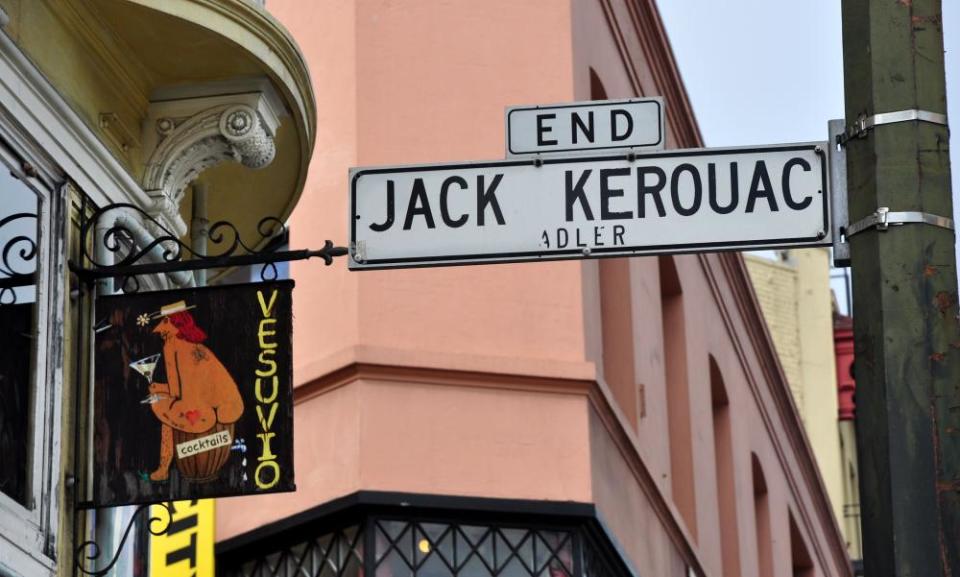Lawrence Ferlinghetti obituary

Lawrence Ferlinghetti, poet, artist, activist and founder of San Francisco’s famous City Lights Bookstore, who has died aged 101 of interstitial lung disease, was the least “beat” of the Beat Generation. In addition to a political commitment that blended anarchism and ecology – he loathed the motor car, calling it “the infernal combustion engine” – he had an instinctive business sense, founded on the philosophy of small is beautiful. City Lights, which he started in partnership with the magazine editor Peter Martin in the early 1950s, is still among the most welcoming of shops, with its tables and chairs, sheaves of magazines, and signs saying: “Pick a book, sit down, and read.”
Ferlinghetti discouraged interviewers and seekers of personal information. “If I had some biographical questionnaire to answer, I would always make something up,” he once said. Different reference books give different dates of birth, and one published story had it that he wrote his doctoral dissertation on the place of the pissoir in French literature. For many years, he listed his dog, Homer, as City Lights’ publicity and public relations officer. The poet recalled that Homer Ferlinghetti received regular mail, but that his public relations career stalled when he peed against a policeman’s leg. For this act of citizenship, he was immortalised by his master in the poem Dog.
Perhaps the facts made Ferlinghetti uncomfortable. He was born Lawrence Monsanto Ferling in Yonkers, New York, to a French mother, Albertine Mendes-Monsanto, and an Italian father, Carlo Ferlinghetti, an auctioneer, who had shortened the family name to Ferling. His parents were unable to care for him, however (sometimes Ferlinghetti said his father had died before his birth, sometimes after), and he was rescued by an aunt, Emily Monsanto. She took him to France, where they lived for his first six years. Returning to the US, Emily was employed as a governess by a family called Lawrence, a branch of the one that founded Sarah Lawrence College. “Then she left me there,” Ferlinghetti told an interviewer in 1978. “She just disappeared one day, and that family brought me up.”
His education was extensive. In the early 1940s, he attended the University of North Carolina, where a professor introduced him to the vernacular voice in poetry. This was a revelation: you didn’t have to sound like TS Eliot to write a poem. After wartime naval service had taken him back to Europe, Ferlinghetti enrolled at the Sorbonne, studying French literature while translating poets and novelists in his spare time. One day in a restaurant, he noticed that the paper tablecloth had a poem written on it, and that it was signed “Jacques Prévert”. He took the tablecloth with him as he left the restaurant, and some years later translated the poems in Prévert’s Paroles, eventually published, under the original title, by his own City Lights Books.
Back in New York again in 1946, Ferlinghetti went to Columbia University, preparing a thesis on Ruskin and Turner. He just missed meeting Allen Ginsberg and Jack Kerouac, who by then had either been banned from (Ginsberg) or had dropped out of (Kerouac) the university. Ferlinghetti did not team up with the Beats until eight years later, in San Francisco.
Drawn to Paris once more at the end of the 1940s, he met George Whitman, proprietor of the English-language bookshop opposite Notre Dame, which was first known as Le Mistral and is now Shakespeare and Company. Ferlinghetti looked to Whitman as an example when he opened City Lights Bookstore in 1953. It was the first all-paperback bookshop in the US, and, as Ferlinghetti said, “Once we opened, we just couldn’t get the doors closed.” He ran the place more in the spirit of public service than for profit, and by the 70s was content to live on his book royalties and plough the takings at the counter back into the shop.
Two years after starting City Lights, Ferlinghetti published his own collection of poems, Pictures of the Gone World, as No 1 in the Pocket Poets series, little four by five-inch, black-and-white paperbacks, which continue to appear today – one of the most popular literary lists of modern times. It was at this stage that he reverted to the original family name, Ferlinghetti. The next two Pocket Poets after Ferlinghetti were Kenneth Rexroth and Kenneth Patchen – as a result, both were drafted as “fathers of the Beat Generation”, somewhat to their displeasure – but it was the fourth in the series that ensured the list’s success. And for that, as Ferlinghetti was quick to point out, they had to thank the San Francisco police department.

The book was Howl and Other Poems, by Allen Ginsberg. Ferlinghetti had heard Ginsberg read the title poem at an event at the Six Gallery, San Francisco, in October 1955. On returning home, he sent the poet a message that consciously echoed the famous letter from Ralph Waldo Emerson to Walt Whitman after Emerson had read Whitman’s Leaves of Grass: “I greet you at the beginning of a great career.” The proprietor of City Lights added: “When do I get the manuscript?”
The book was published the following year, in an edition of 1,000 copies. However, after a failed attempt by the police to prosecute the bookseller for peddling obscene material, the reprints could not come fast enough. Ferlinghetti joked that the police “took over the advertising account and did a much better job”. Howl remains the bedrock of City Lights’ success as a publishing concern. It has now gone through well over 50 reprints, often more than one a year.
Ferlinghetti’s own poetry is irreverent, cajoling, casual and loose-limbed, sometimes excessively so. His models were Whitman and William Carlos Williams. In partnership with Rexroth, he took part in many poetry and jazz events on the West Coast, and the two made a record together. Ferlinghetti later became disillusioned with the poetry and jazz combination – “The poet ended up sounding like he was hawking fish from a street corner,” he said.
His verse on the page, though, suggests a spoken origin, as in his poem Underwear:
Underwear controls everything in the end
Take foundation garments for instance
They are really fascist forms of underground government ….
In addition to his many collections of verse, including A Coney Island of the Mind (1958), The Secret Meaning of Things (1969) and Endless Life (1981), Ferlinghetti wrote two novels: Love in the Days of Rage (1988), which is set during the student revolt of 1968 in Paris, and Her (1960), a more experimental work, a classic “poet’s novel”.
On one of his transatlantic voyages, Ferlinghetti met Selden Kirby-Smith (known as Kirby), whom he had had a passing acquaintance with at Columbia. They married in 1951 and had two children, Julie and Lorenzo, but were divorced in 1976.
In 1971, Nancy Peters, a former librarian at the Library of Congress, joined the company, and as time went on played a larger part in running the business, leaving Ferlinghetti to his creative work. She served as executive director from 1984 until 2007, and then continued to be involved as a co-owner of the business.

Ferlinghetti also had a serious interest in painting, and in 1990 the University of California mounted a retrospective. Many poems feature the names of painters, or employ a self-consciously “painterly” style, such as Short Story in a Painting of Gustav Klimt or Returning to Paris with Pissarro.
Ferlinghetti disliked being associated with the Beats, though he benefited from it, and, despite his love of Ginsberg, was apt to lament the commercialisation of the Beat Generation. Ginsberg, he said, “fabricated the whole thing out of his imagination”. But, happily contradicting himself, he could add, as late as 1996, “It’s still the only rebellion around.”
A collection of the correspondence between Ferlinghetti and Ginsberg was published in 2015, under the title I Greet You at the Beginning of a Great Career. At the same time, a selection of his travel journals appeared, Writing Across Landscapes.

Ferlinghetti expressed disappointment in other Beat writers for their unstructured approach to politics. He decided to travel to Cuba to see the Castro regime for himself and later wrote One Thousand Words for Fidel Castro, which ends, “Fidel … I give you my sprig of laurel.” Another political poem evoked a surrealistic scene by Goya, showing “freeways 50 lanes wide”, with “fewer tumbrils / but more maimed citizens / in painted cars”. In 2012 he declined to accept an award from the Hungarian Pen club, in protest at the policies of prime minister Viktor Orbán.
City Lights, open till midnight seven days a week, was Ferlinghetti’s way of infusing the spirit of resistance peacefully into the streets of San Francisco.
With Peters, he wrote a Literary Guide to San Francisco (1980), and in 1988 was responsible for the renaming of 10 streets after writers associated with the city, including Jack Kerouac Alley, partly composed of City Lights’ back wall. In 1994, he himself was similarly honoured by Via Ferlinghetti, the first time a street has been named after a living writer in the history of the city.
He is survived by his children and three grandchildren.
• Lawrence Monsanto Ferlinghetti, poet, artist and bookseller, born 24 March 1919; died 22 February 2021


